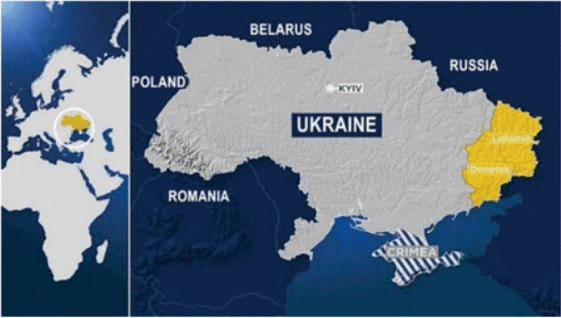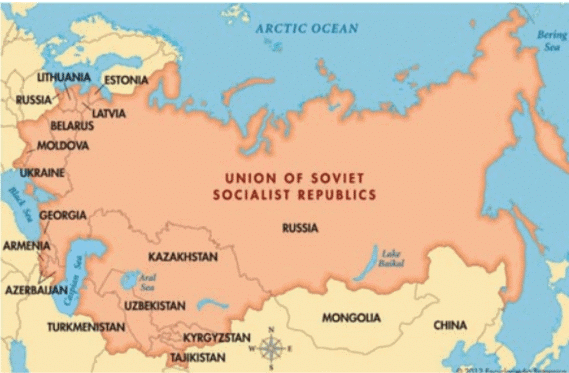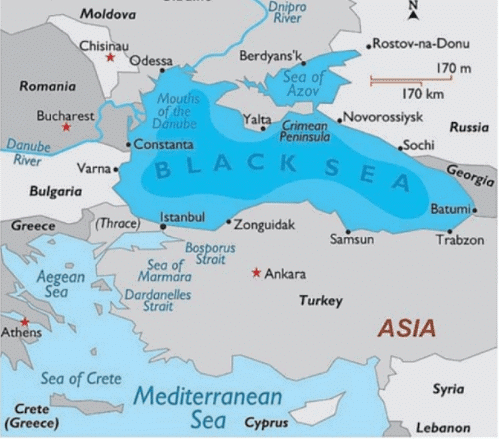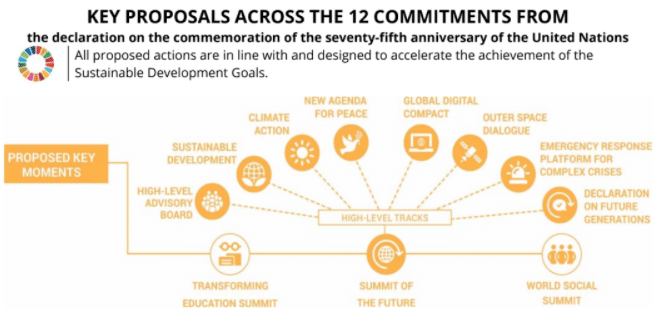International Relations: February 2022 Current Affairs - UPSC PDF Download
1. Ukraine Crisis
Russian military buildup near Ukrainian border has raised fears of Russian invasion in the coming days. Russia considers Ukraine becoming more integrated with NATO as a threat to its national security. Earlier, Russia had warned NATO against its eastward expansion. Russia also iterated that Russians and Ukrainians are “one people”, part of the “Russian civilisation”. In this backdrop let us try and understand the issue in detail and its impact on global geo-politics.
Roots of this Conflict
- Ukraine was part of the Soviet Union until its 1991 collapse.
- In 2004, Orange Revolution began after reports of widespread vote-rigging in presidential election nominally won by pro-Russian candidate Viktor Yanukovych.
- In 2014, Revolution of Dignity began in Ukraine, which saw months-long protests which toppled pro-Moscow Ukrainian president Viktor Yanukovych.
- Russia used the power vacuum to annex Crimea Crimean Peninsula.
- Conflict broke out between the Ukrainian government and Russian-backed separatists who declared two regions in eastern Ukraine, Donetsk and Luhansk, known as the Donbas, self-proclaimed republics.
Countries formed by Disintegration of erstwhile USSR

Strategic Calculations of Russia
- Russia, the world’s largest country by land mass, lacks natural borders except the Arctic Ocean in the north and the Pacific in the far east.
- Geopolitics of Russia’s insecurity: Russia’s heartland runs from St. Petersburg through Moscow to the Volga region lies on plains and is vulnerable to attacks. Also, there is lack of natural boundaries between Russia and Eastern Europe. The experience of Napoleon’s invasion, WWI and WWII when Russia got attacked is always heavy on Russia’s strategic calculations. But the disintegration of the Soviet Union in 1990s, threw its security calculations into disarray, deepening its historical insecurity.
- This makes Russia to claim strategic influence in its Eastern European neighbours as a guarantee of its security.
Response to Nato's Expansion
- Russia’s view on NATO: Russia claims that the end of the cold war and the disintegration of the USSR led to the end of animosities between the Western Europe and Russia. Thus, there was no security threat for Europe and thus, no need for NATO that is a vestige of the cold war. The continued expansion of NATO wherein smaller countries part of Eastern Europe joining Russia enhances the insecurity of Russia. Russia, thus is, uncomfortable with this situation and demands stopping of eastward expansion of the NATO alliance.
- Continued Expansion of NATO: The West had promised that NATO would not expand in the east. But despite the Promises the expansion has continued. In 1999 the Czech Republic, Hungary, and Poland (all were members of the Soviet-led Warsaw Pact) joined NATO. Five years later, seven more countries — including the three Baltic countries of Estonia, Latvia, and Lithuania, all of which share borders with Russia. Further out of the countries that surround Black Sea - Turkey, Bulgaria and Romania are NATO members.
- Russia’s insecurity on Ukraine joining NATO: Russia does not want Ukraine to fall into the hands of NATO, which would threaten its heartland. If Ukraine and Georgia join NATO, Russia’s gateway to Mediterranean Sea would be narrowed. Thus, Russia annexed Crimean Peninsula to secure its access to the Black Sea.
Russia's Focus on Rimland Countries
- South Ossetia and Abkhazia, the self-proclaimed republics that broke away from Georgia, are controlled by Russia-backed forces.
- In Ukraine, the eastern Donbas region is in the hands of pro-Russian rebels.
- Russia has supported the President of Belarus against the protests that erupted in 2020.
- Russia sent thousands of “peacekeepers” to end the war between Armenia and Azerbaijan, re-establishing its strategic dominance.
- Belarus with Russian support had manufactured a migrant crisis on the Polish border of the European Union.
- In the recent protests in Kazakhstan, Russia dispatched troops (under the banner of the Collective Security Treaty Organization, or CSTO) to quell the protests.
Western Response
- US withdrawal from Afghanistan has left the Central Asian Republics under the Russian influence.
- Europe has been opposing Russia’s aggressive moves, but its options are limited because of its dependence on Russian gas.
- The West could not do much when Russia annexed Crimea.
- NATO is unlikely to pick a war with Russia over Ukraine.
- Western policymakers are likely to impose economic sanctions. However, Russia has not been deterred by such sanctions to meet its strategic aims.
Ukrain Crisis and India
- The crisis can complicate India’s relations with the US, Russia and European powers.
- It could also have a bearing on the standoff with China in Ladakh and the situation in Afghanistan.
- The situation is like Cuban Missile Crisis when China launched an attack on India in 1962.
- Both the US and Russia are strategic partners for India. Thus, India would not want to take sides in case of war.
- A conflict could also push Russia much closer to China— which would not be in the larger interest of India.

Locations of Importance in the Black Sea
- Countries surrounding Black Sea are: Ukraine, Russia, Georgia, Turkey, Bulgaria and Romania.
- Important rivers falling in the Black Sea: Danube, Dneiper, Don.
- Bosporus strait in the South of Black Sea to Sea of Marmara which through the Dardanelles strait connects to the Black Sea to the Mediterranean Sea.
- In the north of Black Sea, Kerch strait connects the Black Sea to the Sea of Azov.
2. UN – Challenges and Reform
Global community adopted the Multilateralism post WWII, in the form of UNO. UN recently celebrated 75th anniversary in 2020. However, presently the multilateral world order is facing challenges because of changing nature of the geo-politics and the ineffectiveness of the UN to address the issues concerning the global community.
About Multilateralism
In international relations, multilateralism refers to an alliance of multiple countries pursuing a common goal. Multilateralism leads to collective effort on part of nations over their narrow national interest to tackle global issues.
Benefits of Multilateralism:
- Binds powerful nations – To avoid possibility of future conflict.
- Discourages unilateralism.
- Gives small powers a voice.
- Encourages consensus on the emerging global issues such as terrorism, climate change and other challenging global issues.
- Examples of Multilateral bodies: UN System, WTO , UNFCCC, EU etc.
Challenges to Multilateralism
- • Rise of Nationalistic politics: Seen in global as well emerging powers. Example: BREXIT or withdrawal of UK from the EU marks a dent to the spirit of multilateralism.
- The powerful nations are challenging the multilateral world order.
- Rise in conflicts such as in Syria, Yemen, Afghanistan. This reflects lack of effort on the important players across the globe to collaborate and address critical issues.
- Changing Geopolitics: The rise of China, Concretization of Russia China axis. SCO etc. has made the West conscious of preserving its hegemony. The west sees China as a challenger to the US led world order and does not seem to cooperate with China and Russia. At the same time, China and Russia try to counter the west. This competition has led to erosion of spirit of cooperation and collaboration, hurting multilateralism.
- Lack of consensus on Global issues: Most challenges are cross-national and cross-domain in character requiring multilateral approach. poverty and hunger, climate change, inequality, fake news, terrorism. Thus, a lack of common, collaborative global approach to these multi-dimensional problems and a zero-sum attitude leads to sub-optimal outcomes for everyone.
Challenges In The Functioning of UN And Other Multilateral Bodies
- Issues with UNSC: Rift between the permanent members of the Security Council – Veto power of P5. UNSC permanent members are not representative of the current world order. Despite efforts the expansion of UNSC has not been materialised. Failure of UN on emerging conflicts such as Myanmar, Afghanistan etc.
- UNGA has no substantive powers: UN General Assembly which is a more representative body of global voice plays second fiddle to the super-powers led UNSC.
- World Health Organization failed to provide early warnings during the COVID-19 pandemic.
- World Trade Organisation has failed to conclude the negotiations of the Doha Agenda started in 2001, as bilateralism and protectionism are resurging worldwide, and its dispute settlement system has stalled.
- Lack of accountability: Countries that violate international law have not been held accountable.
- Pursuit of narrow geo – political interest by member nations for their allies and against the enemies. Ex – UNESCO – stopping funding of UNESCO in 2019.
- Higher leadership of World Bank and IMF are taken by USA and EU alternatively. While the poor and developing countries where these institutions mostly work do not get to decide their agenda.
Issues in Financing of UN
- Around 40 UN political missions and peacekeeping operations engage 95,000 troops, police, and civil personnel. But the UN peacekeeping budget, is just a little over $8 billion. Also, countries providing most troops for the peacekeeping efforts are rarely made party to decide the mandate of the peacekeeping missions, which is often dominated by UNSC P5 members.
- Lack of contribution by the member nations: There was an outstanding $711 million in the assessed contribution for the general budget.
- Voluntary contributions dominate: Most of the humanitarian assistance, developmental work, and budgets of the specialised agencies are based on voluntary contributions.
- Climate change financing: Developed nations despite repeated promises have failed to meet their promise to provide $100 bn of climate finance for developing countries despite being responsible for historical emissions which are the prominent reason for present climate change, which is hurting the developing nations hardest.
Our Common Agenda
- To mark the 75th Anniversary of UN, Member States came together to recognise that our challenges are interconnected and can only be addressed through stronger international cooperation and reinvigorated multilateralism with the United Nations at the Centre of our efforts.
- Global leaders pledged to strengthen global governance for the sake of present and coming generations and asked the Secretary General to prepare a report with recommendations to advance our common agenda and respond to current and future challenges.
- UN Secretary General prepared a comprehensivereport titled outlining 12 comprehensive action areas named ‘Our Common Agenda’.
- The important proposals in the report are given below. The Secretary General proposed a Summit of the Future to forge a new global consensus on what our future should look like and what we can do to secure it.















